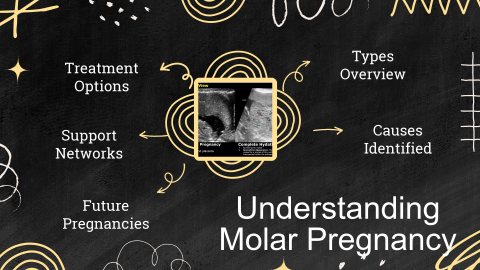If you’ve just learned about molar pregnancy, it might seem overwhelming. This guide is here to help navigate this topic. Molar pregnancies can impact future family planning, so it’s crucial for families to understand what it means and the steps they can take. Our aim is to explain everything you need to know clearly and simply, from causes to support and treatment options.
Understanding Molar Pregnancy: Types, Causes, and Risk Factors
A molar pregnancy happens when there’s an unusual growth of cells inside the womb. There are two types:
- Complete molar pregnancy: Only abnormal cells grow.
- Partial molar pregnancy: There are both normal and abnormal cells.
The cause often involves genetic mistakes once the egg and sperm meet. Risk factors include being over the age of 35 or under 20 and having a past molar pregnancy. Knowing the causes and understanding these risk factors can help in early recognition and prevention.
Recognizing Symptoms and Receiving a Diagnosis
Symptoms of a molar pregnancy can sometimes seem like regular pregnancy issues but can include:
- Unusual vaginal bleeding
- Severe nausea or vomiting
- High blood pressure
If you experience these, it’s vital to see a doctor quickly. Delay can complicate recovery. Diagnosis often involves ultrasound scans and hormone tests to check for irregularities. These methods help confirm if a molar pregnancy is present. Early diagnosis allows for more effective management and care.
Treatment and Management of Molar Pregnancy: What Families Should Know!
Treatment usually begins with a procedure called Dilation and Curettage (D&C). Here’s what to expect:
- Removing abnormal tissue to prevent complications.
- Monitoring hormone levels to ensure no abnormal cells remain.
- Additional treatments might be necessary if cells persist.
Recently, places like Yashoda Hospitals have introduced advanced medical practices to handle and treat molar pregnancies more effectively. It’s important to stay informed and weigh all possible options.
Rebuilding After Diagnosis: Emotional and Practical Support
Going through a molar pregnancy can be tough emotionally. It’s crucial to address these feelings and look for help. Support comes in many forms:
- Counseling sessions to talk about your feelings with a professional.
- Support groups where families share experiences and advice.
These resources can provide comfort and valuable insights. Moreover, aftercare is key; regular check-ups are essential. Use this time to discuss future pregnancies with your healthcare provider to ensure the best outcomes.
Reducing Risks and Promoting Open Conversations
Preventing another molar pregnancy may require:
- Small lifestyle changes, such as following a balanced diet.
- Regular health check-ups to catch any developing issues.
Awareness helps a lot. Talk openly about your feelings and experiences. This can break down barriers and misconceptions, making it easier for others to learn and feel supported. Open conversations can boost understanding and support within the community.
In sum, a molar pregnancy might seem daunting, but knowledge and support can ease this journey. With the right information and medical advancements, especially from trusted institutions like Yashoda Hospitals, families can face these challenges confidently.
